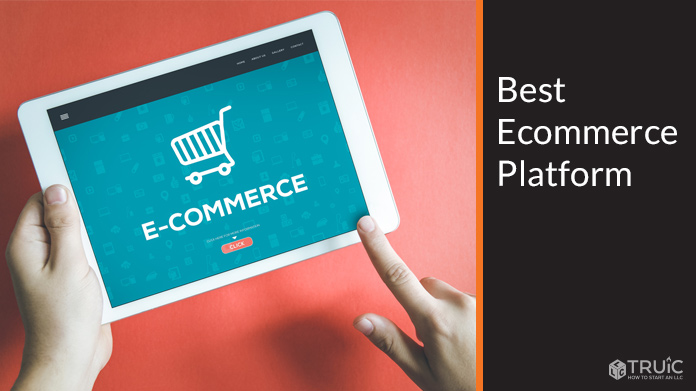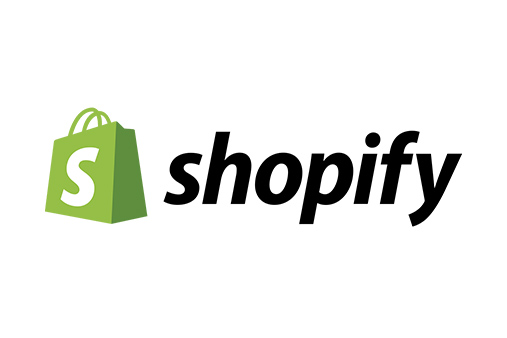Top 8 Best Ecommerce Platforms of 2024
Choosing the best ecommerce platform for your business is one of the most important choices you’ll make about your business’s website. Whether you are just launching an ecommerce business or trying to expand the reach of your established online store, the right ecommerce platform will help you operate smoothly and grow quickly.
There are many ecommerce software options to choose from, and their features seem to change all the time. This guide to the eight best ecommerce platforms of 2024 will help you find the right mix of ecommerce functionality, user-friendliness, and affordable pricing you need to run your ecommerce business right.
Recommended Ecommerce Platform: Shopify comes out on top as our #1 best ecommerce platform for online stores.

Best Ecommerce Platform
Subscribe to our YouTube channel
- Shopify — Overall Best for Ecommerce
- WooCommerce — Most Popular for Ecommerce
- BigCommerce — Best for Large Ecommerce
- GoDaddy — Best for Easy Ecommerce
- Weebly — Best for Affordable Ecommerce
- Web.com — Best for Marketing and Ecommerce
- Squarespace — Best for Service-Based Ecommerce
- Shopify Lite — Best for Minimal Ecommerce
Shopify: Overall Best for Ecommerce
Shopify is our top pick for small businesses because its ecommerce platform is flexible and straightforward. You don’t need much technical knowledge to get started with your Shopify store. Even so, Shopify can still perform search engine optimization (SEO), generate shipping labels, provide sales and marketing reports, sell items on social media and other marketplaces, and even manage international sales. And Shopify’s built-in Shopify Payments system allows you to take payments from any major credit card and mobile wallet.
If your business sells merchandise both online and in person (at a pop-up or a brick-and-mortar store, for instance), Shopify can synchronize inventories across multiple locations. For in-person sales, Shopify offers two point-of-sale (POS) options: Shopify POS Lite is included with all Shopify plans and allows your team to make sales via Shopify from a mobile device or computer. Shopify POS Pro costs an extra monthly fee per location and includes specific hardware and advanced staffing and inventory tools.
Though Shopify builds an intuitive, user-friendly online store, it is not made to build a unique, full-featured website beyond a store and a blog. If ecommerce is secondary to your business and you already have a website but want to add some “buy” buttons and start selling merchandise, Shopify has an option called Shopify Lite (#8 on this list).
And for large ecommerce businesses with lots of sales, large inventories, and complex global fulfillment, Shopify Plus is Shopify’s enterprise-level solution. These plans start at $2,000 per month but still may beat the cost of custom-built ecommerce websites by thousands of dollars.
Take a deeper dive into what Shopify can do for you with our helpful Shopify guides:
Shopify Pros
- Shopify makes simple, easy-to-navigate web stores that will be familiar to most of your customers.
- There are many Shopify themes available, for both the store and a hosted blog, that allow you to extend your business brand throughout your website.
- Shopify allows you to easily manage your storefront, inventory, sales, and fulfillment from one dashboard, no matter how many locations you sell or ship from.
- Where Shopify is missing features you might want, it offers hundreds of plugins — some at little or no cost.
- Shopify works online and in person, allowing for low-cost transactions anywhere.
- Shopify offers a 14-day free trial.
Shopify Cons
- Shopify charges an extra fee on any transactions that don’t use Shopify Payments.
- Best Shopify Payments transaction fee rates only available at more expensive plan tiers.
- Shopify’s cheapest plan (other than Shopify Lite) is not as cheap as some other platforms.
Shopify: Overall Best for Ecommerce
The Shopify ecommerce website builder is an awesome tool for small business owners looking to create a professional online store. Start your free trial today by clicking the button below.
WooCommerce: Popular for Ecommerce
WooCommerce is a plugin for WordPress, the free website builder and content management system (CMS) that powers over 40% of the internet’s websites. Like WordPress, WooCommerce is free and open source, meaning users can use its code to create plugins and extensions. However, many of these plugins and extensions cost money.
To use WooCommerce, you need to have a WordPress website. WordPress itself is free, but you will have to cover the cost of building and hosting your website. While using WooCommerce is not truly “free,” it may still be the most cost-effective option.
In its basic form, WooCommerce may also require a bit more technical knowledge to successfully build in all the features you want your website to have. But combined with the extreme customizability of WordPress and WooCommerce’s vast library of plugins and extensions, it is the best bet when you want a complex, unique website built around your specific needs.
We recommend GoDaddy for hosting and building a WordPress site. GoDaddy WordPress hosting plans include much of the security and SEO tools — and even a number of premium ecommerce add-ons — that you might have to pay extra for with other hosting services. TRUiC readers can save up to 70% off WordPress hosting and get a free domain with GoDaddy WordPress hosting. Plans with WooCommerce start at only $15.99/month.
Learn more about WooCommerce by reading these other articles:
WooCommerce Pros
- WooCommerce can do just about anything with the right combination of plugins, extensions, and possibly custom coding.
- WordPress allows for a website as unique and beautiful as you can imagine.
- Depending on your coding expertise, development and design may cost nothing.
- WooCommerce’s flexibility means it can change and grow alongside your business.
- WooCommerce doesn’t lock you into any paid ecommerce platform’s payment system or suite of apps, allowing you to mix and match service providers if necessary.
WooCommerce Cons
- Hosting, domain registration, security tools, web design, plugins and extensions, themes, and other costs add up quickly.
- Each plugin you need to use is another point in your system that could possibly fail and cause you to lose business while your site or store is down.
- Without coding knowledge or a third-party website builder or web design firm, WordPress and WooCommerce are out of the range of most business owners’ skills.
Many of the cons listed above can be addressed by hosting a WooCommerce website with GoDaddy. GoDaddy’s WordPress hosting plans come with free access to numerous paid plugins, too — but it doesn’t penalize you for using other ones if you prefer to. GoDaddy even has a website builder to help you design a WordPress site with little to no previous experience.
WooCommerce is a great option, so long as you understand the costs. With hosting through GoDaddy, building your online store is easy and TRUiC readers can save up to 70% off WordPress hosting and get a free domain.
BigCommerce: Built for Large Ecommerce
BigCommerce is an enterprise-scale ecommerce platform that largely caters to larger, more established ecommerce businesses. However, the BigCommerce Essentials plans are designed for smaller businesses. The cheapest of these starts at $29.95 per month, though if your business makes more than $50,000 in sales per year, you’ll be forced onto a more expensive plan. The more expensive plans rise steeply, to $79.95 and then $299.95 per month.
BigCommerce is focused on core ecommerce business offerings, including real-time shipping quotes, multi-currency sales and reporting, product ratings and reviews, and unlimited staff accounts for your team to use. The plans are built to scale up with your business as it grows. If you outgrow the $400,000 per year limit of the highest tier of Essentials plans, a BigCommerce Enterprise plan is available with custom pricing.
Learn more about BigCommerce with these useful articles:
BigCommerce Pros
- BigCommerce hosts your website with industry-standard security and web hosting tools.
- User-friendly, no-frills web design lets your products do the talking for your business, but also allows for blogging when you want it.
- BigCommerce doesn’t lock you into any payment processor, and doesn’t take a per-transaction fee as some other platforms do.
- Large ecommerce operations will like BigCommerce’s built-in infrastructure for high-traffic websites and large-scale order fulfillment.
BigCommerce Cons
- If your business conducts more than $50,000 in sales annually, pricing can get quite high.
- The limited Bigcommerce templates may not allow your brand to be fully expressed throughout your website.
If you run a well-established online store or are looking to drastically expand your ecommerce empire, BigCommerce could be the choice for you. Get started with a BigCommerce free trial.
GoDaddy: Best for Easy Ecommerce
GoDaddy is one of the most popular web hosting and domain registration services on the internet. Known for award-winning customer support, GoDaddy makes having a website as easy as possible so that inexperienced small business owners don’t get overwhelmed.
The GoDaddy website builder is a one-stop shop for building a website. With two ecommerce plans, GoDaddy’s simple, drag-and-drop interface and vast library of templates and themes make building a website a breeze. With GoDaddy’s two ecommerce-enabled plans, you can get a store up and running with just a few clicks.
GoDaddy even offers a physical POS system for in-person sales, and inventory syncing to keep your system up to date no matter how you conduct business. Features such as a payment processor, email marketing, and SEO are built in, so you don’t have to get bogged down in installing plugins for every little thing.
For more on GoDaddy, refer to these GoDaddy guides:
GoDaddy Pros
- GoDaddy is one of the easiest ecommerce platforms to learn and operate, even if you have no experience.
- GoDaddy’s pricing is hard to beat, considering all of its built-in features.
- Marketing tools are included with GoDaddy, allowing even first-time business owners to take advantage of online marketing tools via email and social media.
- With GoDaddy Studio, you can create custom-branded content for your business social media campaigns from various templates.
- GoDaddy’s transaction fees are among the lowest in the market.
GoDaddy Cons
- GoDaddy’s user-friendliness does make it somewhat inflexible — the lack of fine-tuning controls and customization might be frustrating to more advanced users.
- GoDaddy only offers discounted shipping on United States Postal Service (USPS) shipping, not other third-party shippers.
GoDaddy is one of the easiest website builders to use, especially for beginners. TRUiC readers receive an extra deal on any GoDaddy plan.
Weebly: Affordable Ecommerce
Weebly is a website builder that was purchased by the payment processing company Square. Now, Weebly is an attractive yet simple website builder powered by one of the most popular ecommerce companies around.
Weebly’s website builder is intuitive and easy to use, with a big selection of themes and templates. With Square behind it, the ecommerce tools available are at or above the industry standard. Though you’ll need a higher-priced tier to take PayPal payments, you can take almost any other kind of payment with even the free, ad-supported plan.
For more information on Weebly, check out these other useful articles:
Weebly Pros
- The drag-and-drop website builder is easy to use and includes great themes.
- SEO fields are clearly defined to optimize your products’ placement in search engine results.
- The Weebly app store and Square suite of products provide customization for special tasks or needs.
Weebly Cons
- Advanced customization may require some coding knowledge to achieve.
- The choice between Square and Weebly’s website builder is annoyingly confusing.
- The free and cheapest paid versions are supported by ads for Square on your site.
Weebly is simple and great for business owners on a tight budget, you can have your own online store up and running for a few dollars a month. Try Weebly out for free.
Web.com: Ecommerce and Marketing
Web.com is a domain registration, web hosting, and web development company, and — now that it includes a simple online store website builder — an ecommerce platform. Web.com’s longstanding expertise in website development and maintenance give it a solid foundation for ecommerce functionality.
The ecommerce plans Web.com offers start at only $13.95 per month, and include web hosting, a drag-and-drop website builder, and unlimited products in your online store. Web.com also includes marketing tools appealing to brand new businesses and established ecommerce companies alike. SEO tools and online business directory placements are handled automatically, and Web.com even has a tool to help you create a simple, recognizable logo for your website.
For more information on what Web.com can do for your business, read these:
Web.com Pros
- Web.com’s easy-to-use website builder includes over 150 themes, all optimized for mobile devices.
- Web.com’s customer service is excellent and reflects the knowledge that it has accumulated after 20-plus years in business.
- Web.com marketing tools are handy for first-time business owners or website operators.
- At the most expensive tier, Web.com has built-in support for third-party fulfillment options like Amazon Multi-Channel Fulfillment.
Web.com Cons
- Editing images and other files can be tricky in Web.com’s interface.
- Third-party marketplace selling (such as eBay, Amazon, or Walmart) is only available in the most expensive plan.
Although you won’t be able to offer unlimited products with Web.com, if you’re a beginner and need fantastic marketing resources, this could be the right fit. Try Web.com today.
Squarespace: Service-Based Ecommerce
Squarespace is a popular website builder known for its minimal, beautiful templates and easy drag-and-drop builder. However, Squarespace websites are also fully customizable, so if you decide to hire a designer, you can fully control the look of your website.
Squarespace has two ecommerce plans, both of which offer sales both online and in person via mobile POS. The more expensive plan includes merchandising tools to showcase featured items, point shoppers to related items, and allow customers to join waitlists. You can sell subscriptions or set appointments for service-based commerce as well.
For more information on Squarespace, refer to these articles:
Squarespace Pros
- Squarespace templates are thoughtful and functional, but also fully customizable.
- Squarespace has a straightforward pricing model and includes many of the tools you need to operate a store.
- Unlike many ecommerce platforms, Squarespace makes operating a restaurant or other service-based business online simple and engaging for customers.
- Websites built with Squarespace don’t feel like an afterthought to an online store — instead, your store and the other content of your website all feel professional and intentional.
Squarespace Cons
- The sheer amount of features Squarespace offers can be overwhelming if all you want is to build an online store.
- Subscription sales are only available on the more expensive plan.
Squarespace makes it easy to offer subscription services and book appointments for those looking to add service-based ecommerce to their business website. Get started with a Squarespace free trial.
Shopify Lite: Minimal Ecommerce
If you already have a website and are just getting started with ecommerce, Shopify Lite might be the choice for your business. Shopify Lite is a service that allows you to easily add “buy” buttons to an existing website. It’s not a full-featured web store, but if you only sell a few items, or want to experiment with selling goods or services online, it’s a great way to try it out. And it starts at just $9 per month.
Shopify Lite keeps all the coding behind the scenes and is compatible with most websites, including WordPress sites. With the Shopify Lite dashboard, you can manage inventory, view sales reports, manage orders and products, even offer discount codes. And with Shopify POS Lite, you can accept payments in person. This makes it a great option for even service-based freelancers or businesses that sell at pop-up farmer’s markets or trade shows.
For more information on Shopify Lite, check out these articles:
Shopify Lite Pros
- Shopify Lite is the most affordable ecommerce platform for selling products from a website you already built.
- You can sell on social media with Shopify Lite by embedding “buy” links.
- Though limited, Shopify Lite includes inventory management and sales reporting, so you can see how your products are selling from anywhere.
Shopify Lite Cons
- Shopify Lite won’t be full-featured enough if your ecommerce business keeps growing.
- You’re locked into Shopify Payments — it’s neither the most expensive payment processor, nor is it the cheapest.
Shopify Lite is easy to install on an already established business website and works great for adding some easy extra income. Get started with a Shopify Lite free trial.
Best Ecommerce Platform Overall: Shopify
Based on the pros and cons of all the ecommerce platforms out there, we think Shopify is the best fit for most small businesses. Shopify can handle anything from a small store that only sells a few items, to a big international sales operation with multiple warehouses and points of sale.
Shopify is priced competitively in the field, and bundles together web hosting, website and store design, inventory management, marketing, and payment processing. With all of that under one roof and managed on a single dashboard, you have time to manage your business instead of your website.
Get Started With The Best Ecommerce Builder
Shopify is the top ecommerce platform for a reason. Shopify has all the tools you need to build a great online store. Test out the builder is a free trial by clicking the button below.


